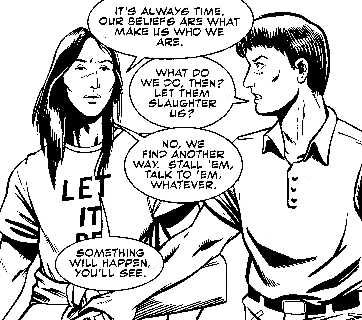All of these factors most likely contributed to the development of Nixon's innovative Indian policy, but perhaps the most intriguing impact may have been a personal relationship with his Whittier College football coach, Wallace Newman.
Newman was a member of the La Jolla Band of Mission Indians, whose reservation is located in southern California. His mother was of Basque and Luiseno Indian descent. Newman was well-versed in the traditions and history of the La Jolla community. He spoke the Luiseno language fluently and mastered family and tribal customs that he learned from his great aunt, "Yela" Maria Antonio Nelson.
Nixon, a substitute tackle, did not get much playing time, but was on the team for three seasons. Newman admired and respected Nixon as a student, friend and politician. In practices, Nixon often got roughed up, but he did not complain and always came back to meet the next plays. Nixon did not play enough while at Whittier College to earn a letter, but years later Newman had the honor of presenting the president with an honorary letter. Newman supported Nixon's political campaigns, from his 1946 run for Congress through to the 1968 presidential election, and remained a close friend after Nixon's resignation from the presidency in 1974.
Newman had a long-term and significant influence on Nixon as a man, and most likely provided some first-hand knowledge of Indian people and life that few modern presidents have had. In his memoirs, the former president said that other than his own father, Newman was the person who had the greatest influence on his life. His interest and policy proposals in Indian affairs often puzzled his group of immediate advisers, who probably did not share the same interest.
Perhaps the next great champion of Indian rights is some college kid taking a Native studies course right now. Or reading Sherman Alexie or watching Adam Beach. Or perusing PEACE PARTY and this blog, for all I know.


No comments:
Post a Comment
Note: Only a member of this blog may post a comment.